A comparison between Russia and America. How long will it be before we have our own class of citizens who turn to “hunting stray dogs to eat them”? A quote from a referenced non-fiction work cited herein.
It is less than a week before the 2018 Midterm Election happens and all of the polling done recently to figure out what this country wants arrives in that one and only real poll. How many and what percentage of our electorate will participate, how has history (and its truthful, honest and factual understanding of it) influenced the results, how much has the gerrymandering and voter suppression affected its outcome unfairly, how have the results allowed for some respected and intelligent and “fair” adjustment to the voting process to allow for a more inclusive, truly American enfranchisement process to determine future choices based on learning from past mistakes and prejudices, how much have the Russians (and other non-American players) influenced its outcome through cyber subterfuge and even open attacks that fooled the fools…….all these factors are still in the future tense of yet. Also, will there be a blue wave in spite of many contravening factors?
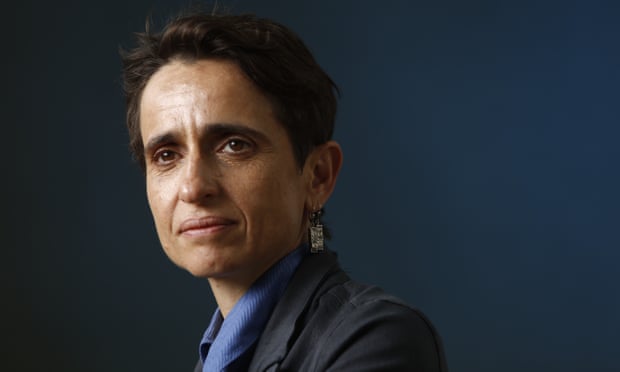
Russian/American author Masha Gessen
As we enter this week, the person who most caught my attention is Masha Gessen. Born in Russia, a journalist, gay, a mother, and one of the most vocal critics of Vladimir Putin. She has recently written another book of non-fiction, this time winning the National Book Award called The Future is History 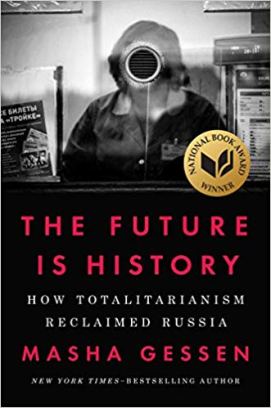 . She writes in English and her native Russian, but this title is close to home, as she believes the society and politics of Russia cannot escape its totalitarian past. I am wondering if our own culture is breeding too many terminally selfish citizens, only focused on me or them, and not all that is possible when knowing just a bit more. Lessen calls the citizens of the country “Homo Sovieticus” but was not the first to coin the term. Much has been postulated about the impact/damage done to the collective psyche of the country and its citizens that makes them ripe for authority and willingly accepting the loss of liberties. Seems we could start some other comparisons elsewhere with these aspects…n’es pas.
. She writes in English and her native Russian, but this title is close to home, as she believes the society and politics of Russia cannot escape its totalitarian past. I am wondering if our own culture is breeding too many terminally selfish citizens, only focused on me or them, and not all that is possible when knowing just a bit more. Lessen calls the citizens of the country “Homo Sovieticus” but was not the first to coin the term. Much has been postulated about the impact/damage done to the collective psyche of the country and its citizens that makes them ripe for authority and willingly accepting the loss of liberties. Seems we could start some other comparisons elsewhere with these aspects…n’es pas.
From a review in the Guardian about Gessen’s new book, a quote/excerpt from its author is posted below. This review found the book “fascinating, if flawed” but it deserves entry into the discussion about our own past, present and future and herein I continue. The review also offers an explanation for the title of this blog. It is useful to read history, learn from it for one’s own sake, well-being and betterment, as well as one’s country’s….and the world’s well-being. But, we obviously have 35% of this country still not heeding that advice…wallowing in self, assenting to being labeled with a title by someone else that allows them to behave, react, obfuscate, taunt, kill, choose, say and cause so much harm because their adopted title frees them from the responsibility to learn, to love, to seek more for the betterment of self…and the betterment of all, regardless of artificial political boundaries (though, admittedly, these often are meaningful and extremely important boundaries on a map…as they will be in next Tuesday’s vote) :
“The “main resource” of this increasingly repressive and authoritarian state is “the Soviet citizen weaned on generations of doublethink and collective hostage-taking: Homo Sovieticus”. As diagnosed in 1989 by Yuri Levada, sociologist and the founder of Russia’s first polling organisation, Homo Sovieticus was in favour of a powerful paternalistic state, deeply conformist and suspicious of all and any individual initiative that threatened to destabilise existing group hierarchies and identities.”
From a review of the book in the New York Times, (an interesting review by Francis Fukuyama, who wrote his own book, The End of History, and the twists of coincidence are fun) this excerpt is useful in my own blog as I follow it up by asking questions and doing so by replacing Russian references with American ones:
“Levada’s surveys revealed the existence of homo sovieticus, a fearful, isolated, authority-loving personality created by Communism. But in the early 1990s this type of individual seemed to be disappearing, and Gudkov was hopeful that it was just a passing historical interlude. The number of respondents, for example, who thought that homosexuals should be “liquidated” began to drop. But, then, to his horror, the numbers began to rise again in the 1990s; under Putin it became clear that most Russians were not craving freedom or converging with their counterparts in the West; homo sovieticus was alive and well. In 2016 the justice ministry classified the Levada Center as a “foreign agent.” “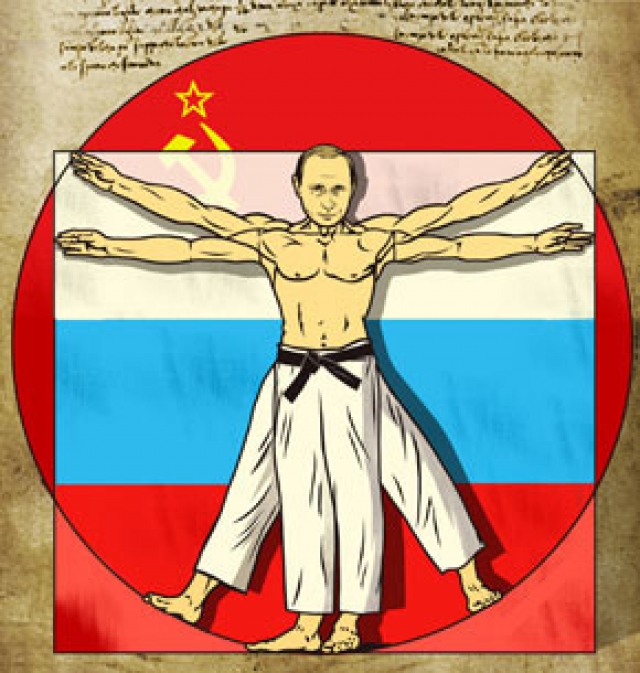
another excerpt from the NYTimes review that bears airing and comparing is:
“The one area where I wish Gessen had spent more time was in a deeper analysis of ordinary Putin backers, rather than an opportunist like Dugin. Polls, including some from the Levada Center, show high government support. But how deep is that support, how internalized are the “values” now being pushed by the regime and how long will they survive a prolonged economic stagnation? One cannot really label Russia as totalitarian in the absence of a strongly mobilizing ideology. I somehow doubt that fear of pedophilia will be a sufficiently grand cause to rouse a deeply traumatized people and make them great again.”
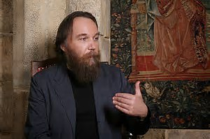 Here is where I need to digress for a moment to speak of Alexander Dugin and “Eurasianism” (Putin’s Rasputin?). That such an individual is given credence and is elevated to the position of power and influence does give support to the Rasputin comparison. As I am comparing the Putin/Russia description with our own Donald Trump/MAGA version, we could easily look for the counterpart to Dugin in the Trump administration and see similarities with several of his closest characters in the administration. That each leader pushes nationalism, populism, fear, exclusion, hatred, envisioning an imaginary past of greatness to pursue, accepting authoritarian solutions and limiting of individual rights, should give us on this side of the Atlantic pause. Perhaps we should all read Gessen’s treatise.
Here is where I need to digress for a moment to speak of Alexander Dugin and “Eurasianism” (Putin’s Rasputin?). That such an individual is given credence and is elevated to the position of power and influence does give support to the Rasputin comparison. As I am comparing the Putin/Russia description with our own Donald Trump/MAGA version, we could easily look for the counterpart to Dugin in the Trump administration and see similarities with several of his closest characters in the administration. That each leader pushes nationalism, populism, fear, exclusion, hatred, envisioning an imaginary past of greatness to pursue, accepting authoritarian solutions and limiting of individual rights, should give us on this side of the Atlantic pause. Perhaps we should all read Gessen’s treatise.
Why is Trump so obsessed with Putin. He surely has not read Soviet history…and certainly not Gessen’s book. If we mirror Gessen’s account of Russia’s thirty year attempts to move towards the new old Russia, where Gessen claims its psychological DNA as a country is pulling it back to a Stalinist predisposition against its will and welfare, can we replace a few names and nouns to come up with our own description of what is happening in America in 2018? Will we soon have those armed and dangerous hunters of gays in America who denounce the propaganda of sodomy at some US university, mirroring those who denounced the “Propaganda of Sodomy at Perm State Research University”. Like Putin, Trump shares many techniques of leadership and governance with him. Both men’s followers are subject to easy manipulation and acceptance of pure propaganda and falsehoods. Here’s to the hope of a Blue Wave.
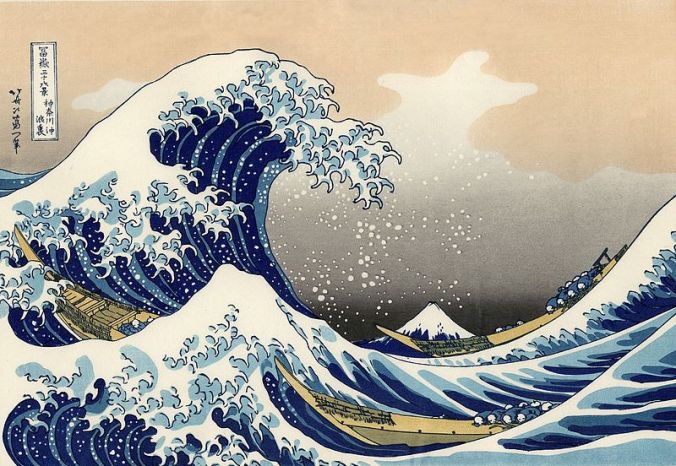
And, finally, this morning a friend and fellow retired educator posted this on Facebook. It is from one of his former students from the 1970s who is now himself and educator and is from the community of Squirrel Hill and recently addressed his students at morning assembly… It is worth a few moments of your time to read to make a bit of sense out of the horror of the past week. Shalom
(From Steve’s post) I pass on to you another eloquent piece of writing from my former elementary grade student from the mid-70’s, Matt Weiss. Please read this assembly address and then go back to your homerooms, humbled and transformed…
Good morning everyone. I’m Mr. Weiss and my family and I live in Squirrel Hill in the house my wife grew up, so our family has been part of Squirrel Hill for nearly 50 years. I don’t know about you, but I have not been very productive this week. Now, in my case, that’s not particularly unusual, but it has been more pronounced in recent days than I can remember.
Of course, like a lot of you, I have been distracted and distressed. It doesn’t take my mind long to wander from whatever paper I am trying to grade or lesson I am trying to plan to the dreadful events of last Saturday. There is an irony in that what we might rightly call “unthinkable,” we cannot stop thinking about. I would also say that there have been some welcome distractions. The outpouring of love and support, from our immediate community to the victims and their families, from many of you who are not Jewish or from Squirrel Hill to those of us who are, and from the nation and, indeed, the entire world, to our city, has been genuinely moving. I have sometimes wondered if the gestures I see online at times like these–the special profile pictures and tweets in solidarity with people struck by tragedy–are just trite and empty ones we perform to make us feel good, but I don’t believe that now. They are small acts of solidarity, but they make a difference. I have felt, so to speak, the arms of the nation and the world wrapped around our community and our city, almost as palpably as I have felt the arms of my friends, neighbors and colleagues wrapped around me and mine around them this week, and that has lifted me. But it has also exhausted me, and the sleep I have lost reading emails, texts, and posts, and fielding calls have taken a toll. All of this is part of the reason I think we find it hard to turn our minds to our work.
But there is another reason that I want to address this morning: In times like these, it is easy to feel like our work here doesn’t matter–that it is meaningless compared to the life and death issues swirling around us. “What does it matter,” we may ask ourselves, “why Macbeth did whatever he did or Muhammad did whatever he did or this chemical compound did whatever it did when people are being gunned down in houses of prayer? How can I immerse myself in this world of abstractions when the real world is crying out in a hundred kinds of agony and in a billion different voices? What does it matter?”
If you feel this way, I understand, and I share your feelings. I think that, for some of us, we simply want to retreat from this chaos and madness, so little of which we can control, and that is perfectly understandable and, sometimes, necessary. For some of us, however, we want to do something, anything, to make it better. We Jews have a concept for this: it is called Tikun Olam, and it means “to repair the world.” To repair the world means to bind its wounds, to ease its pain, to rebuild where there has been destruction. To make fruitful places that have been barren. To push love into every dark corner befouled by hate. The Mishnah tells is, “It is not your obligation to complete this work, but neither are you free to desist from it.” Many of us feel compelled to do this work and to do it now.
And we should.
And your studies, my job–they do not always feel like this work–this repairing the world, especially not now, but I would argue that they are.
Please believe me when I tell you that your work is important, that we need you to be scholars, to be learners. Not just for the usual reasons–to get into college, to get a job–but for much higher reasons: your scholarship will help make you people who are capable of repairing our world.
In some disciplines, this is an easy case to make, starting with my own. History helps us understand how we got to where we are. The past is full of warnings and lessons—few of them easy, but all of them essential. History is your ancestors giving you a light from their world to illuminate your own. English, drama, and art help us understand the human soul, what motivates it, what it needs, and how it can be shaped toward good or twisted toward evil. Greater truths may be told through literature and the arts than can be spoken in any sworn testimony before any court, and these disciplines are dedicated to the propagation of truth and beauty, even in the darkest times, the darkest places. World languages make friends of strangers. They make “us” out of people who might otherwise be “them,” and heaven knows we need more “us” and less “them” at this time.
But what of math and science? These seemingly hard-headed, often abstract subjects? They sometimes seem so removed from the desperate dramas in which we know we must play a role? How can they help us?
I would argue that they may be the most essential, for these are the disciplines most dedicated to reason, and reason is indispensable if we are to combat the forces of ignorance, hatred, suspicion and baseless conspiracy threatening to tear us apart–actively tearing us apart. There is, of course, a practical and tangible role math and science can play in making a brighter future. People my age live in a world where every day we rely on devices, some we can hold in our hands and some we cannot see or may not even know about, that we would not have been able to imagine when we were people your age, but technology can produce problems as well as solve them.
Reason, then, is the greatest gift these disciplines have to offer. They train your minds to demand facts, to insist that proposals make sense, to be bold and imaginative in envisioning what might be but methodical in making what we imagine into reality. It was reason that banished darkness–literally, and brought us light, and it is reason that banishes the darkness of racism and prejudice and reveals to us the scientific truth of our common humanity.
In the television drama, House of Cards, the deeply cynical politician who is the main character turns directly to the camera, speaking to the unseen audience–to us–smirks, and says, “Welcome to the Death of the Age of Reason.”
Well, I am not ready to let the Age of Reason go so quickly, and I am counting on you to make sure we continue to live in an Age of Reason. You will do this in many ways, but the work you do here and now will ground you in reason–that precious, fragile but mighty commodity.
So it is hard, I know, to turn your mind to your work. It is hard for me to turn my mind to my own, but let us commit to it. I ask you this not as a teacher here, not as a parent, but as a person of my generation ready to pass the torch of leadership in this world to yours. I have faith in you, and along with my colleagues will do my best to prepare you so we can step in line behind you and follow you into a better, brighter day.
Shalom, peace, to you all. You are dismissed.
Pingback: Utahns Discuss Communism-Socialism-Capitalism: Is It Time, with the GOP warning that the Democrats want to make the US a Stalinist country, that the REAL definition of Socialism gets discussed rationally? | Maine Musing